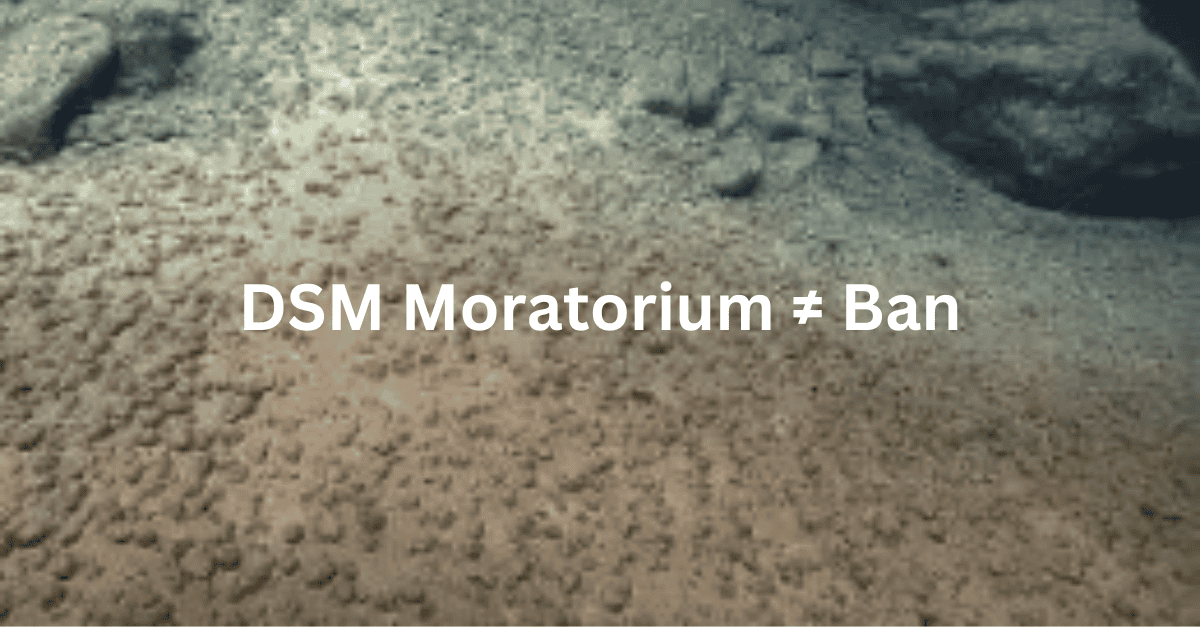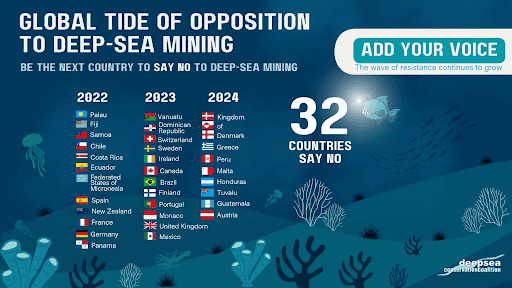Link to image.
You may have seen calls for a global deep-sea mining (DSM) moratorium and graphics identifying countries that have said “no.” But what does a moratorium really mean? For 31 of the 32 countries that have signed onto a moratorium, it primarily signifies that:
- Legal structures should be in place to properly regulate deep-sea mining and
- Deep-sea mining should only occur if it can be managed in a way that ensures effective protection of the marine environment.
Interestingly, these principles align with the purpose of the approval processes set by regulators like the International Seabed Authority (ISA) and other country regulators like the Cook Islands Seabed Minerals Authority (SBMA). The ISA is the organization through which parties to the United Nations Convention on the Law of the Sea (UNCLOS) organize and control all mineral-related activities in international waters for the benefit of humankind. The ISA is also mandated to protect the marine environment from harmful effects that may arise from deep-seabed-related activities.
A key component of the regulatory process is the Environmental Impact Assessment (EIA), which must be approved by the ISA before any mining can commence. The EIA documents the potential impacts and outlines prevention and mitigation measures. Based on this assessment, the ISA determines whether the net impact is acceptable and whether mining can proceed.
The similarity in the purpose of moratoriums and approvals processes made me ask: If the purpose of a moratorium is the same as the regulatory process for DSM, what’s the point of a moratorium? It seems that environmental NGOs are asking governments to sign onto moratoriums to create the impression that more jurisdictions are saying “no” to DSM. However, this isn’t entirely accurate. Even France, whose parliament voted to ban deep-sea mining, still has laws related to UNCLOS on the books and remains a sponsoring state for an exploration contract in international waters. Essentially, signing onto a moratorium means supporting the purpose of UNCLOS and the ISA—something these countries are already doing.
For me, this brings into question if most non-governmental organizations (NGOs) are genuinely interested in a moratorium or instead a complete and permanent ban on DSM. Supporting a permanent ban is the right of any stakeholder, and those voices should be included and considered an essential part of this international discussion. However, conflating a moratorium with a categorical “no” is misleading. It obscures what I believe to be the true viewpoint (no DSM), making it harder to have an open and honest discussion about deep-sea mining.
Rather than putting resources into persuading governments to adopt a moratorium that duplicates the goals of regulations, conservation efforts may be better spent prioritizing and encouraging more research to understand potential impacts. Impossible Metals fully supports completing a comprehensive and rigorous EIA under an approved regulatory process, including fulsome stakeholder engagement, before any mining activities are allowed to proceed.

